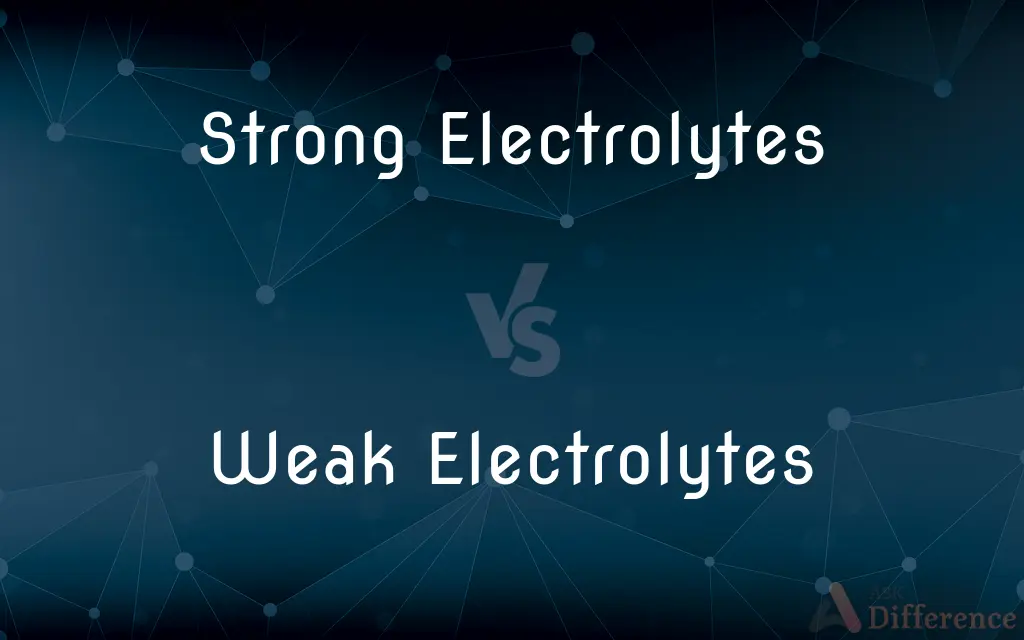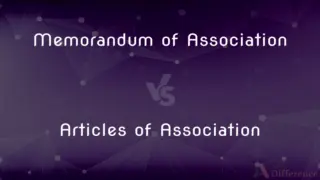Strong Electrolytes vs. Weak Electrolytes — What's the Difference?
By Tayyaba Rehman — Published on December 16, 2023
Strong Electrolytes dissociate completely in solution, producing ions, while Weak Electrolytes only partially dissociate.

Difference Between Strong Electrolytes and Weak Electrolytes
Table of Contents
ADVERTISEMENT
Key Differences
Strong Electrolytes are substances that, when dissolved in water, completely dissociate into their constituent ions. This means that virtually every molecule of a Strong Electrolyte breaks apart. On the other hand, Weak Electrolytes are substances that only partially dissociate in solution. This results in an equilibrium between the dissolved ions and the un-dissociated molecules.
Strong Electrolytes generally include soluble salts, strong acids, and strong bases. Their solutions conduct electricity efficiently because of the abundance of free ions. In contrast, solutions of Weak Electrolytes contain fewer free ions and therefore conduct electricity less efficiently.
Strong Electrolytes, due to their complete dissociation, show a higher electrical conductivity compared to Weak Electrolytes. This complete dissociation ensures a maximum number of ions in the solution. On the contrary, Weak Electrolytes produce a mixture of ions and un-dissociated molecules, thus limiting the number of free ions available for conducting electricity.
The behavior of Strong Electrolytes can often be predicted based on certain rules and solubility guidelines. Weak Electrolytes, however, require more intricate knowledge and understanding, as their behavior in solution depends on various factors, including concentration and temperature.
Comparison Chart
Dissociation in Solution
Completely dissociate into ions.
Partially dissociate into ions.
ADVERTISEMENT
Electrical Conductivity
High due to the abundance of ions.
Lower due to fewer free ions.
Typical Examples
Soluble salts, strong acids, strong bases.
Weak acids, weak bases, and some organic compounds.
Behavior Predictability
Often predictable based on solubility rules.
Behavior varies based on concentration and temperature.
PH Impact
Can cause significant pH changes.
Cause minor pH changes.
Compare with Definitions
Strong Electrolytes
Strong Electrolytes can significantly alter the pH of a solution when added.
Adding hydrochloric acid (HCl) to water drastically lowers its pH since it's a Strong Electrolyte.
Weak Electrolytes
Weak Electrolytes only partially dissociate into ions in solution.
Acetic acid (CH3COOH) is a Weak Electrolyte as it doesn't fully ionize in water.
Strong Electrolytes
Strong Electrolytes are efficient conductors of electricity in aqueous solutions.
A solution of potassium hydroxide (KOH) allows electric current to pass through it easily due to its nature as a Strong Electrolyte.
Weak Electrolytes
Weak Electrolytes are poor conductors of electricity compared to strong ones.
Water containing dissolved carbonic acid (H2CO3) has limited electrical conductivity due to its Weak Electrolyte nature.
Strong Electrolytes
Strong Electrolytes include many soluble salts and strong acids/bases.
Nitric acid (HNO3) is classified as a Strong Electrolyte because it fully ionizes in solution.
Weak Electrolytes
Weak Electrolytes produce a mixture of ions and undissociated molecules in solution.
A solution of ammonia (NH3) contains both NH3 molecules and NH4+ ions, showcasing its property as a Weak Electrolyte.
Strong Electrolytes
Strong Electrolytes are substances that fully dissociate in water into ions.
Salt (NaCl) is a Strong Electrolyte because it completely splits into Na+ and Cl- ions in water.
Weak Electrolytes
Weak Electrolytes encompass many weak acids, weak bases, and certain organic compounds.
Methyl alcohol (CH3OH) behaves as a Weak Electrolyte when dissolved in water.
Strong Electrolytes
Strong Electrolytes yield a high concentration of ions in solution.
When sulfuric acid (H2SO4) dissolves in water, it acts as a Strong Electrolyte, producing 2 H+ ions and a SO4^2- ion.
Weak Electrolytes
Weak Electrolytes cause only minor changes in solution pH upon addition.
Adding a small amount of HF to water doesn't alter the pH drastically because HF is a Weak Electrolyte.
Common Curiosities
Why do Strong Electrolytes conduct electricity efficiently?
Strong Electrolytes produce a high concentration of free ions in solution, facilitating efficient electrical conduction.
How do Weak Electrolytes behave in water?
Weak Electrolytes partially dissociate in water, producing a mix of ions and undissociated molecules.
What's a common example of a Weak Electrolyte?
Acetic acid (CH3COOH) is a typical example of a Weak Electrolyte.
How do Strong Electrolytes affect pH?
Strong Electrolytes can cause significant pH changes when added to a solution.
How can one differentiate between Strong Electrolytes and Weak Electrolytes in a lab setting?
Measuring electrical conductivity can help differentiate; solutions of Strong Electrolytes will have higher conductivity than those of Weak Electrolytes.
Can the behavior of Weak Electrolytes change with concentration?
Yes, the behavior of Weak Electrolytes can vary based on their concentration in solution.
Why are Weak Electrolytes poor conductors of electricity?
Weak Electrolytes produce fewer free ions in solution, leading to limited electrical conductivity.
Do Weak Electrolytes establish an equilibrium in solution?
Yes, Weak Electrolytes establish an equilibrium between dissociated ions and undissociated molecules.
What are Strong Electrolytes?
Strong Electrolytes are substances that fully dissociate into ions in solution.
Are all acids and bases Strong Electrolytes?
No, only strong acids and bases are Strong Electrolytes; weak acids and bases are Weak Electrolytes.
Are salts always Strong Electrolytes?
While many salts are Strong Electrolytes, not all salts completely dissociate in solution.
Can Strong Electrolytes exist in a non-aqueous solution?
Yes, Strong Electrolytes can exist in non-aqueous solutions, but their behavior might vary.
What happens to the molecules of Strong Electrolytes in water?
Molecules of Strong Electrolytes fully break apart into their constituent ions in water.
Why don't Weak Electrolytes dissociate completely?
Weak Electrolytes don't dissociate completely due to their molecular structure and weaker ionizing tendencies.
Are all Weak Electrolytes weak acids or weak bases?
While many Weak Electrolytes are weak acids or bases, some, like certain organic compounds, don't fit these categories.
Share Your Discovery

Previous Comparison
Meso vs. Enantiomers
Next Comparison
Memorandum of Association vs. Articles of AssociationAuthor Spotlight
Written by
Tayyaba RehmanTayyaba Rehman is a distinguished writer, currently serving as a primary contributor to askdifference.com. As a researcher in semantics and etymology, Tayyaba's passion for the complexity of languages and their distinctions has found a perfect home on the platform. Tayyaba delves into the intricacies of language, distinguishing between commonly confused words and phrases, thereby providing clarity for readers worldwide.












































